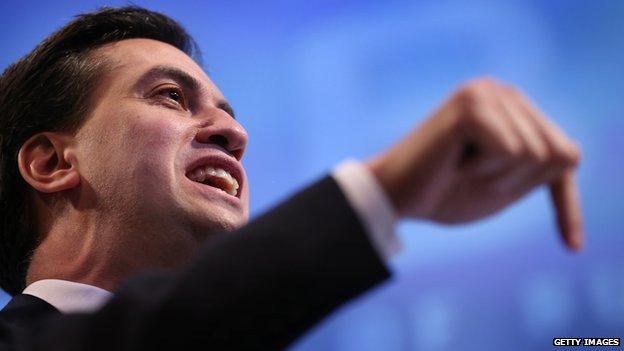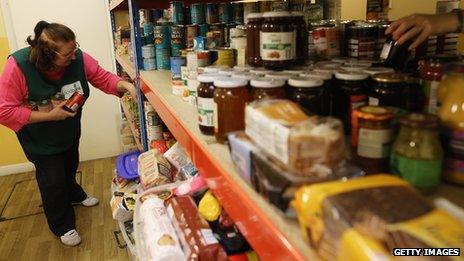Blue Labour: Would Ed Miliband shrink the welfare state?
- Published

Welfare reform has become one of the most divisive issues in austerity Britain. Now, a rising force within the Labour Party wants to silence the party's critics and win the welfare debate - by abandoning some of its oldest principles.
Its adherents want to scale back the state's role in welfare, reward with extra support people who have "paid in" more than others, and even take away universal benefits.
They are not a right-wing think tank, they are Blue Labour. And they are closer than ever to the very heart of the Labour Party.
The Blue Labour movement says power and wealth should be handed to communities, with local organisations replacing the centralised welfare state.
The argument represents a dramatic rethink of what many consider the party's greatest achievement - the creation of the welfare state in 1945 - using ideas usually associated with its political adversaries.
And the movement, once downplayed as a right-leaning "family, faith and flag" outfit responding to concerns about immigration, is growing in influence.
Leading voices such as Marc Stears and Jon Cruddas are in charge of crafting Ed Miliband's speeches and writing policies for the next election manifesto.
The shift is nowhere more evident than in the deprived London borough of Newham, where long-standing Labour Mayor Sir Robin Wales has overseen moves to fast-track people in employment on to the housing waiting list.
"It's not acceptable that generations of people live on welfare - it is not good for them, it is not right and it is not fair, and we have allowed that to happen," he says.
The idea of rewarding those who "pay in" first is not new, even on the political left. It was included in the 1942 report by William Beveridge that became the blueprint for the welfare state.
But its rebirth as possible Labour policy blurs the boundaries of a stormy welfare debate increasingly oversimplified as "strivers and skivers".
Labour's new blue clique believes the welfare state has contributed to the downfall of communities - blamed for so long on inequality and the collapse of industry - by allowing people to think it is acceptable to just take.

Lord Glasman says welfare is undermining communities
Outspoken academic and Labour peer Lord Maurice Glasman, a close friend of Jon Cruddas, advocates removing absolute entitlement to welfare in favour of rewards based on contributions - both financially and socially.
"It's absolutely correct that people who have paid in over the lifetime should be treated better than people who haven't paid in," he says.
"But we have to be more generous in thinking about what contributes giving.
"People who look after their parents, people who care for their children, that is to be conceptualised as 'putting in'."
Bringing people together to solve each other's problems while shrinking an expensive, bureaucratic welfare state and inviting voluntary organisations to run it - what differences, if any, separate these ideas from the ones behind David Cameron's Big Society?
"The Big Society only sees a problem with the state, it sees no problem with the market," Lord Glasman says.
"Our position says both the state and the market represent centralising, administrative, concentrating forces that can dominate you and the only way to resist that is through relational power."
Jon Cruddas has spoken of the public's "lost trust in our welfare state". Marc Stears has described the party's true roots as being separate from a bureaucratic state - "a movement located in particular parts of the country which has always taken local solutions extremely seriously".

The rise of food banks has been linked to welfare cuts and unemployment
It is unlikely that even Blue Labour would encourage shrinking the welfare state with, for example, an under-occupancy taxpenalty, but coalition measures such as localising the Social Fund - including the axing of crisis loans - could be closer to its thinking.
They are reacting in part to a changing tide in which the "welfare party" tag - once a badge of honour - was used by David Cameron as a putdown during Prime Minister's Questions.
Among Labour voters, attitudes to welfare have hardened too. According to figures from the Joseph Rowntree foundation, external, half of its supporters now believe benefit cuts would help claimants to live more independently.
Critics on the political left, including Guardian columnist Polly Toynbee, believe Labour should concentrate on refocusing the welfare argument rather than moving its position.
"The Conservative government has played a blinder," she says.
"About the only thing they've done really, really well is undermining any faith in the benefit system... persuading people that almost everybody on benefits is a scrounger and only hardworking people count."
Exactly how much Blue Labour thinking will become Labour policy remains to be seen.
In 1945, Prime Minister Clement Attlee hailed the nascent welfare state as a new Jerusalem - a reference to the William Blake poem.
Jeremy Cliffe, of the Economist, believes today's Labour Party may struggle to persuade its rank and file its future lies in a new new Jerusalem.
"It's a challenge to the Labour Party, this thinking, because it involves thinking very differently about the role of the state," he says.
"The Attlee government, Labour's perhaps most venerated and mythologised government, set in place a welfare state which involved the benevolent state pulling levers, transferring wealth from those that had it to those that didn't, and this involves moving on quite dramatically from that."
Toynbee is not convinced the concept can move beyond the drawing board - but said its presence could not be ignored.
"Labour MPs know very well that you can't take money away from the very weakest and very poorest and they won't let it happen," she said.
"I'm pretty confident that this will end up being a creative policy with a lot of good ideas, that it will spark all sorts of things off, but don't let's imagine it's a new 1945 settlement."
Listen to Analysis on BBC Radio 4 at 20:30 BST on Monday 27 May or afterwards on the BBC iPlayer.
- Published29 April 2013
- Published2 April 2013
- Published26 October 2013